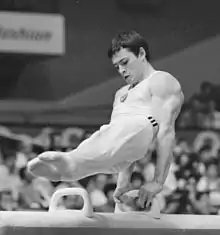Dmitry Bilozerchev
Dmitry Vladimirovich Bilozerchev (Russian: Дмитрий Владимирович Билозерчев, born 22 December 1966 in Moscow) is a Russian gymnastics coach and retired gymnast who represented the Soviet Union. One of the most accomplished gymnasts in history, he is a two-time World All-Around Champion and three-time Olympic Champion. He trained at the Armed Forces sports society in Moscow.[1]
| Dmitry Bilozerchev | ||||||||||||||||||||||||||||||||||||||||||||||||||||||||||||||||||||||||||||||||||||||||||||||||||||||||||||||||||
|---|---|---|---|---|---|---|---|---|---|---|---|---|---|---|---|---|---|---|---|---|---|---|---|---|---|---|---|---|---|---|---|---|---|---|---|---|---|---|---|---|---|---|---|---|---|---|---|---|---|---|---|---|---|---|---|---|---|---|---|---|---|---|---|---|---|---|---|---|---|---|---|---|---|---|---|---|---|---|---|---|---|---|---|---|---|---|---|---|---|---|---|---|---|---|---|---|---|---|---|---|---|---|---|---|---|---|---|---|---|---|---|---|---|---|
 Dmitry Bilozerchev in 1987 | ||||||||||||||||||||||||||||||||||||||||||||||||||||||||||||||||||||||||||||||||||||||||||||||||||||||||||||||||||
| Personal information | ||||||||||||||||||||||||||||||||||||||||||||||||||||||||||||||||||||||||||||||||||||||||||||||||||||||||||||||||||
| Full name | Dmitry Vladimirovich Bilozerchev | |||||||||||||||||||||||||||||||||||||||||||||||||||||||||||||||||||||||||||||||||||||||||||||||||||||||||||||||||
| Country represented | ||||||||||||||||||||||||||||||||||||||||||||||||||||||||||||||||||||||||||||||||||||||||||||||||||||||||||||||||||
| Born | 22 December 1966 Moscow, Russia | |||||||||||||||||||||||||||||||||||||||||||||||||||||||||||||||||||||||||||||||||||||||||||||||||||||||||||||||||
| Height | 1.69 m (5 ft 7 in) | |||||||||||||||||||||||||||||||||||||||||||||||||||||||||||||||||||||||||||||||||||||||||||||||||||||||||||||||||
| Weight | 70 kg (154 lb) | |||||||||||||||||||||||||||||||||||||||||||||||||||||||||||||||||||||||||||||||||||||||||||||||||||||||||||||||||
| Discipline | Men's artistic gymnastics | |||||||||||||||||||||||||||||||||||||||||||||||||||||||||||||||||||||||||||||||||||||||||||||||||||||||||||||||||
| Club | CSKA Moscow | |||||||||||||||||||||||||||||||||||||||||||||||||||||||||||||||||||||||||||||||||||||||||||||||||||||||||||||||||
Medal record
| ||||||||||||||||||||||||||||||||||||||||||||||||||||||||||||||||||||||||||||||||||||||||||||||||||||||||||||||||||
Known for his exemplary form, style, and technique, in 1983 Bilozerchev became the youngest men's World All-Around Champion in history. He then went on to win 5 gold medals at the 1984 Friendship Games, which served as the alternate Olympic Games for the communist nations that boycotted the 1984 Los Angeles Olympics. The following year, he shattered his leg in 41 places in a car crash. The injury was so devastating that doctors were going to amputate the limb were it not for his status as World Champion. In a remarkable comeback, Bilozerchev went on to reclaim his title as World All-Around Champion in 1987 even though his leg was never the same. At the 1988 Seoul Olympics, he won gold medals in the pommel horse, still rings, and in the team competition. He took bronze in the All-Around competition after a mistake on the horizontal bar. Had the competition been held under the new life rule, where all previous scores are dropped, he would have won the gold medal over teammate Vladimir Artemov. [2]
In 1993 he moved to the United States. Together with his wife he owns "The United Sports Academy" in Beaverton, Oregon, where he coaches gymnastics.[3] His son Aleksey and daughter Alice are also artistic gymnasts.[4] In 2003 he was inducted to the International Gymnastics Hall of Fame.[5]
References
- (in Russian) Great Olympic Encyclopedia, vol.1–2, Moscow: Olympia Press Publisher, 2006, entry on "Билозерчев", available online
- Dmitry Bilozerchev Archived 2009-05-22 at the Wayback Machine. sports-reference.com
- unitedsportsacademy.tripod.com
- Bilozertchev: The U.S.’s new secret agent? gymblog.wordpress.com (2007-08-28)
- "DIMITRI BILOZERTCHEV". International Gymnastics Hall of Fame. Retrieved October 3, 2012.
External links
- Dmitry Bilozerchev at Olympics at Sports-Reference.com (archived)
- International Federation of Gymnastics' Profile on Dmitry Bilozerchev at the Wayback Machine (archived September 30, 2007)
- Biography and achievements
- Xtreme Altitude Gymnastics
- Bilozerchev(Parallel bars)